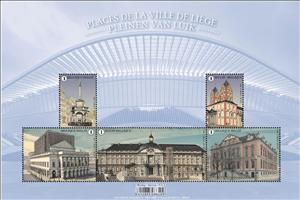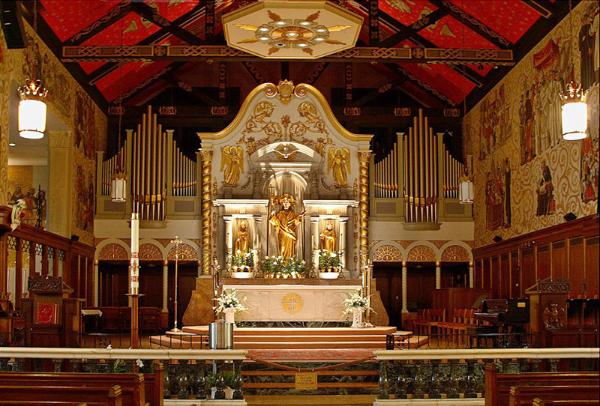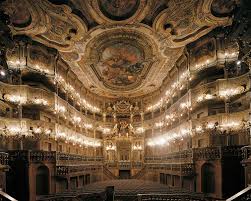Souvenir Sheet: Landmarks of Liège (Belgium 2020)
Landmarks of Liège (Belgium 2020)
15 June (Belgium ) within release Landmarks of Liège (2020) goes into circulation Souvenir Sheet Landmarks of Liège face value 5*1 No Face Value
| Souvenir Sheet Landmarks of Liège in catalogues | |
|---|---|
| Michel: | Mi: BE BL250 |
| Yvert et Tellier: | Yt: BE F4914 |
Souvenir Sheet is horizontal format.
Face value of stamps €0.98 on day of issue. Sheet sold for €9.80 by BPost, the difference being donated to philately promotion.Also in the issue Landmarks of Liège (2020):
- Stamp - Perron Fountain face value 1;
- Stamp - Church of Saint Bartholomew face value 1;
- Stamp - Royal Opera of Wallonia face value 1;
- Stamp - Palace of the Prince-Bishops face value 1;
- Stamp - Town Hall of Liège face value 1;
- Souvenir Sheet - Landmarks of Liège face value 5*1;
Souvenir Sheet Landmarks of Liège it reflects the thematic directions:
A church building, often simply called a church, is a building used for Christian religious activities, particularly worship services. The term in its architectural sense is most often used by Christians to refer to their religious buildings, but it is sometimes used (by analogy) for buildings of other religions. In traditional Christian architecture, the church is often arranged in the shape of a Christian cross. When viewed from plan view the longest part of a cross is represented by the aisle and the junction of the cross is located at the altar area. Towers or domes are often added with the intention of directing the eye of the viewer towards the heavens and inspiring church visitors. Modern church buildings have a variety of architectural styles and layouts; many buildings that were designed for other purposes have now been converted for church use; and, similarly, many original church buildings have been put to other uses. The earliest identified Christian church was a house church founded between 233 and 256. During the 11th through 14th centuries, a wave of building of cathedrals and smaller parish churches occurred across Western Europe. A cathedral is a church, usually Roman Catholic, Anglican, Oriental Orthodox or Eastern Orthodox, housing the seat of a bishop.
A fountain, from the Latin "fons" (genitive "fontis"), meaning source or spring, is a decorative reservoir used for discharging water. It is also a structure that jets water into the air for a decorative or dramatic effect.
An opera house is a theater building used for performances of opera. Like many theaters, it usually includes a stage, an orchestra pit, audience seating, backstage facilities for costumes and building sets, as well as offices for the institution's administration.
A palace is a large residence, often serving as a royal residence or the home for a head of state or another high-ranking dignitary, such as a bishop or archbishop. The word is derived from the Latin name palātium, for Palatine Hill in Rome which housed the Imperial residences




